- Juan Carlos Zorzi
- Amil Biswas
- François Couperin
- Cantaloupe Music LLC
- Viktor Ullmann: The Emperor of Atlantis
- Albany Records
- Frans Vester
- The Three Dramatic Characters
 DISCUSSION: What is a work? John Dante Prevedini leads a discussion about The performing artist as co-creator, including contributions from Halida Dinova, Yekaterina Lebedeva, Béla Hartmann, David Arditti and Stephen Francis Vasta.
DISCUSSION: What is a work? John Dante Prevedini leads a discussion about The performing artist as co-creator, including contributions from Halida Dinova, Yekaterina Lebedeva, Béla Hartmann, David Arditti and Stephen Francis Vasta.
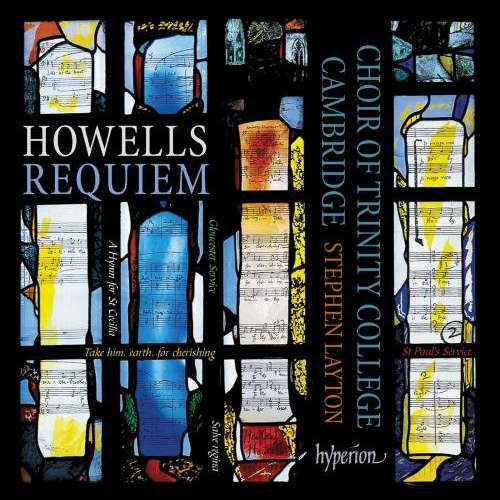 SPONSORED: CD Spotlight. Beautifully Apt - Choral music by Herbert Howells, heard by Robert Anderson.
SPONSORED: CD Spotlight. Beautifully Apt - Choral music by Herbert Howells, heard by Robert Anderson.
All sponsored features >>
Jenő Huszka

In defence of operetta and copyright,
by ANETT FODOR
On 9 February 2020, I was lucky enough to attend the final performance of this season's popular operetta Prince Bob by Jenő Huszka at the National Theatre of Győr, Hungary. It was directed by Denise Radó and performed to a packed house. Operettas are still very popular in Hungary.
118 years ago, Huszka and his two librettists chose an English setting for this work. The main character is a young prince, Prince George. He isn't at all interested in his duties and doesn't like the princess to whom he is bethroted. He and his teacher often sneak out to London in disguise, nobody being aware of their true identity. George uses the nickname, 'Bob'. He meets and falls in love with Annie, the daughter of a poor elderly photographer. The gist of the plot, in a nutshell, is how George becomes king and he and Annie, overcoming difficulties, are finally married.
The main singers, Attila Fejszés (Bob), Zsófia Kisfaludy (Annie), Nóra Fehér (Victoria), Eszter Bellai (the Queen) and Gábor Péter Vincze (Pomponius), portrayed their characters in a really clever and humorous manner. They often made the audience burst into laughter. Although their voices were all good rather than great, the characters were very well played and rather loveable.
Chorus members took part in the scenes and showed not just singing ability, but good acting skills as well. The orchestra, under Szabolcs Medveczky, gave an adequate, if not outstanding performance.
Three scenes changed for the acts on a revolving stage: the main square of a city, the courtyard of the palace and the throne room. These romantic sets, as well as the colourful costumes, were designed by György Csík and were well in keeping with the style of the libretto. They reminded me somewhat of an attractively illustrated children's book.
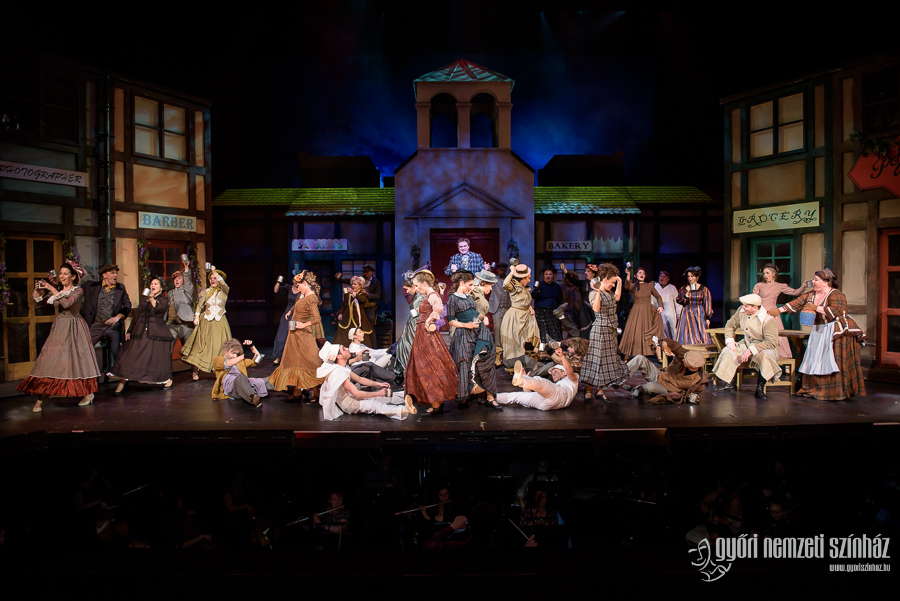
Prince Bob by Jenő Huszka at Győr National Theatre
The audience really enjoyed themselves laughing cheerfully at the witty scenes and rising for a prolonged, enthusiastic ovation when it was over.
MARS
Jenő Huszka (1875-1960) studied composition and violin under János/Hans Koessler and Jenő Hubay at the Music Academy in Budapest, whilst simultaneously reading law. He was not only a well-known prolific composer and excellent violinist, but also a qualified lawyer. Due to his legal qualifications, Dr Huszka became first secretary and later counsellor of the Art Department of the Hungarian Ministry of Education.
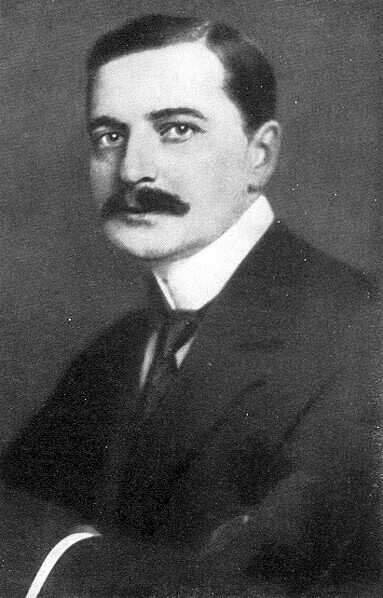
Jenő Huszka (1875-1960) in circa 1910
After the immense success of Prince Bob, Huszka's music was played frequently. He never received royalties, however, as those were unknown in Hungary at the time. He felt that he had to do something to change this situation.
In May 1907, he called a meeting of academy professors, light music operetta composers and the heads of publishing companies. They met in the beerhall Blumenstöckl in Budapest, a place frequented by distinguished Hungarian musicians. They founded the original Hungarian copyright society, which they called MARS (Magyar Zeneszerzők, Szövegírók és Zeneműkiadók Szövetkezete).
One of the first cases of litigation was the Gypsy Case. MARS took action against a gypsy violinist who played Huszka's and other Hungarian composers' music without permission. The violinist defended himself by saying that he played by ear and not from the printed page. Although the Society won the trial, the gypsy musician, being poor, could not pay, so the composers chose to sue the owner of the restaurant. After a while, the Court decided in favour of the Society again.
In 1923, Huszka had an excellent idea: the police should only grant the licence for a social event when the performing rights were paid in advance. After accepting the arguments in the Hungarian Ministry of The Interior, the bill covering them was passed in 1924. This revolutionary act aroused a great deal of interest both at home and abroad.
In 1930, the fifth international conference of CISAC (International Confederation of Societies of Authors and Composers) was organized in Budapest, where Huszka was elected vice-president of the International Federation of Authors' Societies. It was a great honour for both the composer and Hungary.
The conference, held in the Hungarian Academy of Sciences, was an important milestone in the history of copyright law. It also dealt with the emerging gramophone, sound-films and radio rights.
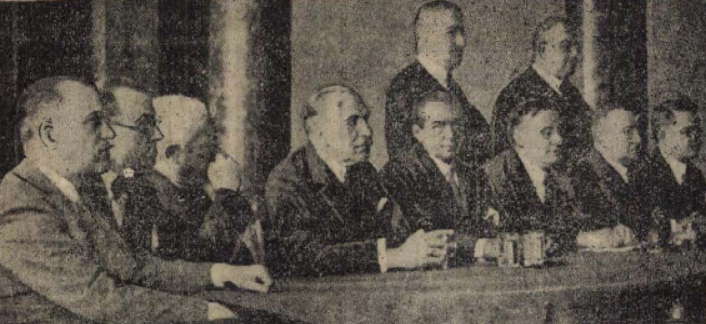
Renowned composers and authors at the Hungarian Academy of Sciences during the CISAC conference. Photo published in an old Hungarian newspaper, Pesti Napló, 29 May 1930. (Huszka is standing at the back.)
Unfortunately, contemporary Hungarian musicians were not represented either in MARS or CISAC. That is why Bartók, Kodály and Dohnányi's works were published by foreign companies.
In the 1940s, due to the tragic political situation in Hungary, Huszka was obliged to resign from his position as president of the society. He had no other choice.
In 1953, five years after the communist takeover, ARTISJUS, a newly created organisation, took over the protection of copyright in Hungary. However, to this day, Huszka's forty-five years of work in copyright defence remain invaluable.
Copyright © 20 February 2020
Anett Fodor,
Győr-Moson-Sopron, Hungary

FURTHER INFORMATION: BOB HERCEG (PRINCE BOB)
FURTHER INFORMATION: JENŐ HUSZKA
FURTHER INFORMATION: PORTRAITS SERIES
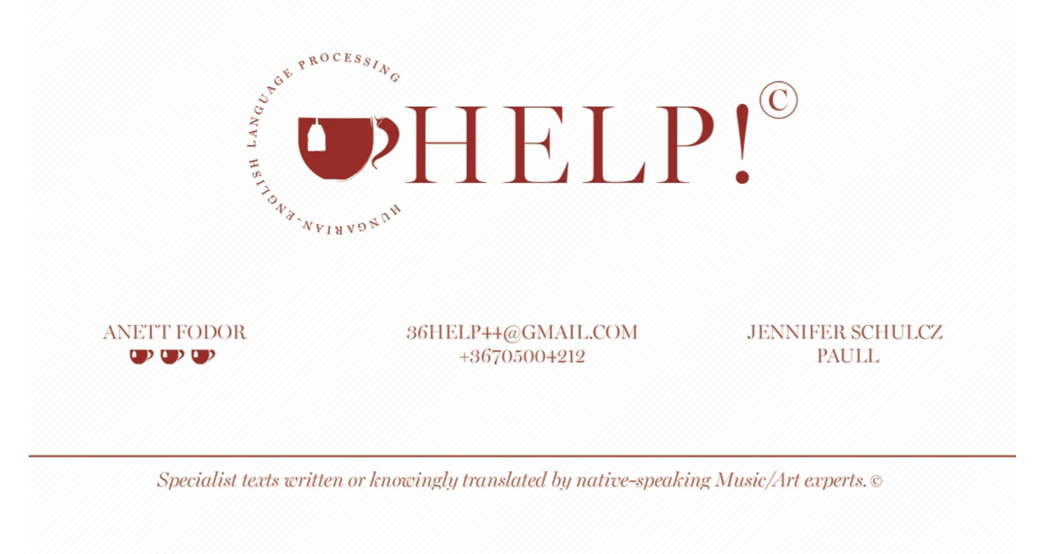
Advertisement


